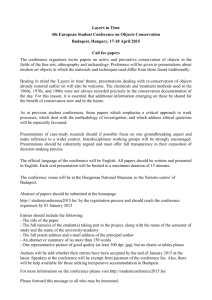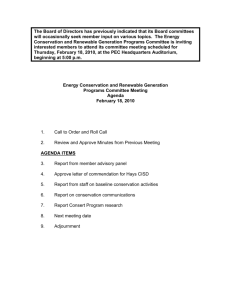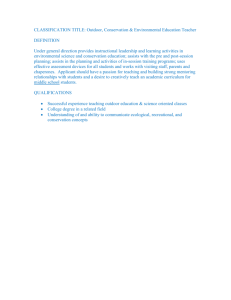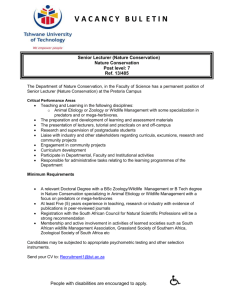APPLICATION OF ANIMAL BEHAVIOR IN CONSERVATION BIOLOGY
advertisement
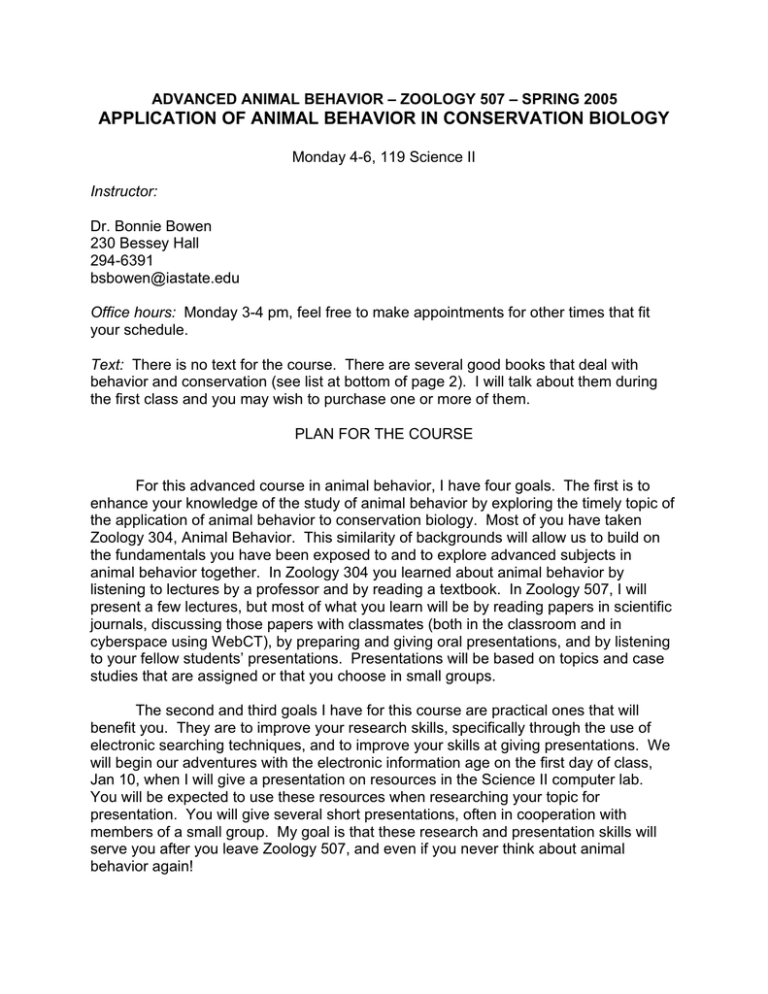
ADVANCED ANIMAL BEHAVIOR – ZOOLOGY 507 – SPRING 2005 APPLICATION OF ANIMAL BEHAVIOR IN CONSERVATION BIOLOGY Monday 4-6, 119 Science II Instructor: Dr. Bonnie Bowen 230 Bessey Hall 294-6391 bsbowen@iastate.edu Office hours: Monday 3-4 pm, feel free to make appointments for other times that fit your schedule. Text: There is no text for the course. There are several good books that deal with behavior and conservation (see list at bottom of page 2). I will talk about them during the first class and you may wish to purchase one or more of them. PLAN FOR THE COURSE For this advanced course in animal behavior, I have four goals. The first is to enhance your knowledge of the study of animal behavior by exploring the timely topic of the application of animal behavior to conservation biology. Most of you have taken Zoology 304, Animal Behavior. This similarity of backgrounds will allow us to build on the fundamentals you have been exposed to and to explore advanced subjects in animal behavior together. In Zoology 304 you learned about animal behavior by listening to lectures by a professor and by reading a textbook. In Zoology 507, I will present a few lectures, but most of what you learn will be by reading papers in scientific journals, discussing those papers with classmates (both in the classroom and in cyberspace using WebCT), by preparing and giving oral presentations, and by listening to your fellow students’ presentations. Presentations will be based on topics and case studies that are assigned or that you choose in small groups. The second and third goals I have for this course are practical ones that will benefit you. They are to improve your research skills, specifically through the use of electronic searching techniques, and to improve your skills at giving presentations. We will begin our adventures with the electronic information age on the first day of class, Jan 10, when I will give a presentation on resources in the Science II computer lab. You will be expected to use these resources when researching your topic for presentation. You will give several short presentations, often in cooperation with members of a small group. My goal is that these research and presentation skills will serve you after you leave Zoology 507, and even if you never think about animal behavior again! The fourth goal I have is to develop a web site for the course that will provide links to sites and information related to the topics we explore in the course. For example, we could post summaries of topics we discuss or annotated bibliographies of specific topics. So I am counting on YOU to help with this part of the course. Evaluation: Your grade in the class will be based on several factors: 1. 50%--Two take-home exams (25% each) that cover the principles of behavior and conservation that we discuss and learn about through readings. Due dates will be announced at least two weeks before exams are distributed. 2. 20%--Participation in WebCT discussions and class participation during discussions. 3. 20%--Your presentations during class. Each student will be expected to give three presentations, 5-10 min each, during the semester. These will be explained during the first class. 4. 10%--Your contributions to the web site. OVERVIEW OF CLASS SCHEDULE DATE TOPIC Jan 10 Introduction to class; Electronic resources—Science II computer lab Jan 17 NO CLASS; KING HOLIDAY Jan 24 – April 28 See detailed schedule on next page May 6 (Fri) FINAL EXAM PERIOD—12:00-2:00 pm Since many students will be graduating, we will reschedule the exam or final class meeting. BOOKS (will be on reserve in library): Behavioral Ecology and Conservation Biology. 1998. Tim Caro, ed. Oxford University Press, New York, USA. QL751 B3425 1998 Behaviour and Conservation. 2000. L. Morris Gosling & William J. Sutherland, eds. Cambridge University Press, Cambridge, UK. QH75 B45 2000 Behavioral Approaches to Conservation in the Wild. 1997. Janine R. Clemmons & Richard Buchholz, eds. Cambridge University Press, Cambridge, UK. QH76 .B44 1997 Animal Behavior and Wildlife Conservation. 2003. Marco Festa-Bianchet & Marco Apollonio, eds. Island Press, Washington, USA. QL751 .A6497 2003 Advanced Animal Behavior Schedule for Zoology 507-2005----January 10, 2003 Subject to change as needed to accommodate interests of students, schedules of guest speakers, or time-sensitive topics DATE January 10 January 17 January 24 TOPIC Introduction Electronic Resources No class February 14 Behavior, genetics & conservation: populations Behavior, genetics & conservation: mating and social systems Behavior, genetics & conservation: mating and social systems Dispersal and philopatry February 21 Habitat selection February 28 Predation risk March 7 Reserve design March 14 Spring break March 21 Aquatic toxicology March 28 Endocrinology April 4 Endocrinology April 11 Parental care April 18 Captive management and reintroductions Conclusions & Wrap-up January 31 February 7 April 25


